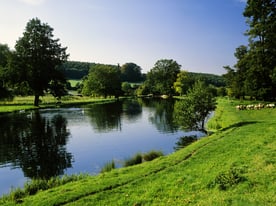Unprecedented changes in the rural sector are presenting UK estate owners and managers with complex challenges, but also many business opportunities.
With public and private funding increasingly available for initiatives which help to protect the rural environment, there is huge potential for land-based businesses to contribute to industry sustainability goals, while also futureproofing their estate.
Benefits of harnessing natural capital
Looking after nature is not a new concept for estate owners or managers. However, as long-standing direct support payments are phased out, initiatives which reward farmers and land owners for investing in natural capital are being introduced. One example is ELMS, which is focused on offering ‘public money for public goods’.
The concept of measuring natural capital encourages estate owners and managers to further understand and quantify elements of nature which could deliver practical or social benefits – whether this is on a local, visible scale or wider societal benefits such as carbon sequestration.
Several environmental indicators are currently in decline, for example biodiversity and water quality, so there has never been a greater societal need for sustainable land management which reinvests in these natural assets.
Income opportunities for sustainable land management

As the rural sector embarks on a new era, there is strong potential for land-based businesses, such as country estates, to derive profit from their natural capital.
By viewing natural capital as an asset, estate owners or managers can include this in future business plans, as they would with any other form of capital in their inventory (e.g. financial or physical assets).
The market for new natural capital ‘products’, such as carbon and biodiversity, continues to grow, and there are increasing commercial opportunities for estate managers to invest in sustainability projects.
There are a range of ways country estate managers can harness natural capital, depending on an estate’s priorities and natural assets. Examples may include maintaining and enhancing wildlife corridors, historic parklands and water sources – all of which could provide the potential to improve a business’s resilience.
Understanding an estate’s natural capital
To explore environmentally friendly income streams which could improve business resilience and create a positive legacy for an estate, understanding the natural capital across specific land areas is the first step.
Fera’s LAND360 Mapping+ package uses the latest software and the expertise of multidisciplinary scientists to give estate managers an accurate baseline assessment of existing natural assets.
Mapping+ indicates areas of high and low biodiversity value, carbon storage and carbon sequestration across land parcels, providing the insight to help when making sustainable and profitable estate management decisions.
Find out more about the LAND360 package and how it could identify new income streams for your estate business here.